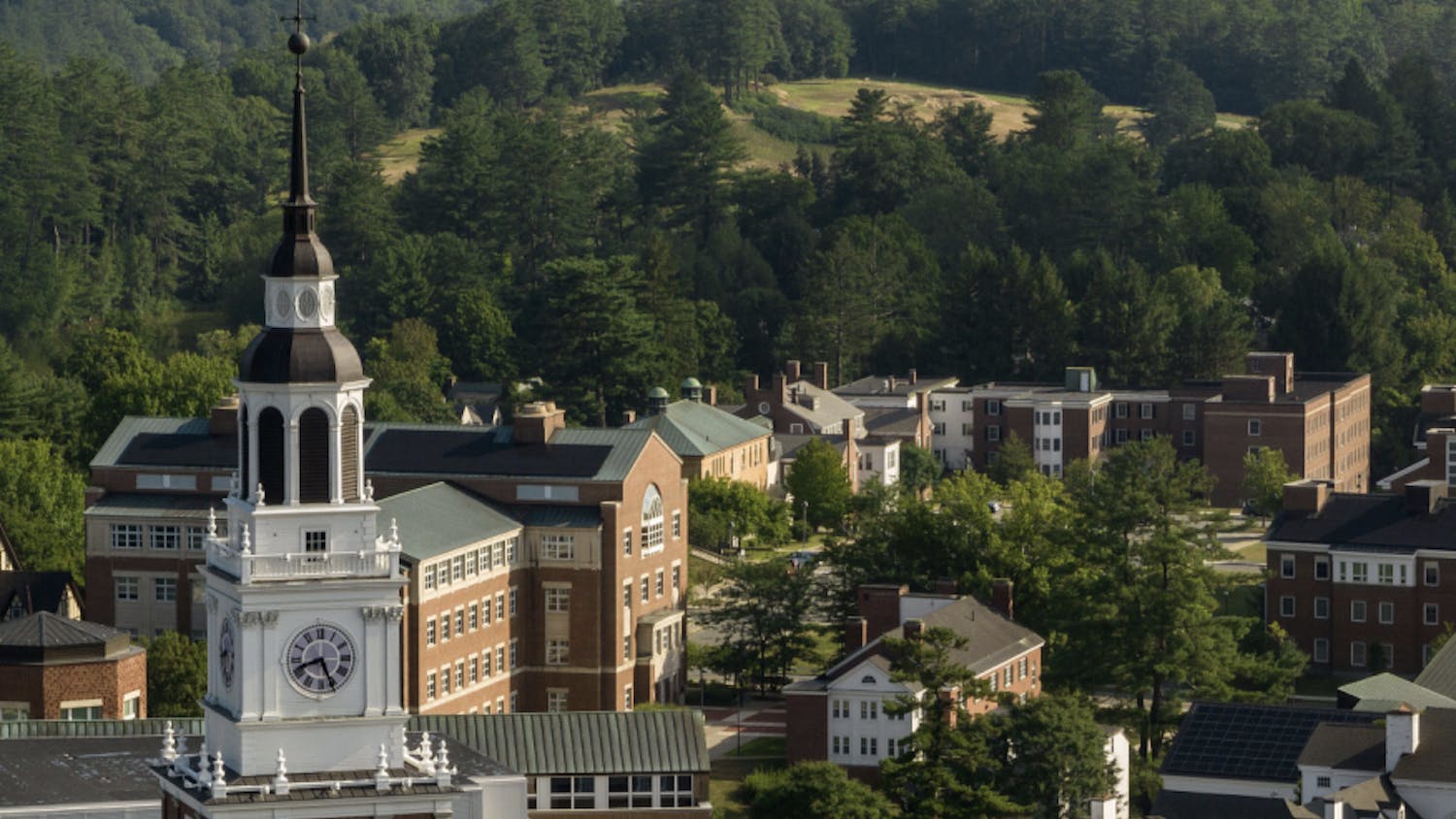Volunteers and participants began this year’s 14th annual Annual Upper Valley Winter Games, a part of the Special Olympics, to the sound of the “March of Olympians” at the Dartmouth Skiway on Saturday. With the anthem, the torch and athletes streaming in, Jim Beattie ’76, director of the games, describes the opening as a highlight as everyone’s excitement shines through.
Seventy-two athletes along with dozens of sponsors and spectators from across New Hampshire and Vermont gathered to watch athletes participate in varying levels of skiing and snowboard competition. The lack of snow from warmer temperatures this year resulted in some events being cancelled and 40 to 50 fewer athletes competing.
Started by Pete Bleyler ’61 and the Dartmouth Club of the Upper Valley in 2003, the regional winter games were started to provide athletes with intellectual disabilities an additional competitive experience, Mary Conroy, Special Olympics staff liaison for the games, said. Generally, there are three major events each year — the winter games, a spring track meet and a fall bowling tournament — that draw participants from nearby towns including Claremont, Bedford, Concord and Franconia.
This year, the games were to include varying levels of skiing, snowboarding and snowshoeing events, but some were cancelled due to lack of snow and proper conditions.
“The area that we used on Saturday is under snowmaking so even if they don’t get much snow, the Skiway can usually lay out snow and get it set up for us,” Beattie said. “But for cross country skiing, which is around the pond, there really wasn’t enough snow to set up the proper tracks, so it had to be cancelled.”
Fewer teams decided to participate in the games this year because of poor ski conditions, Beattie said. Many coaches looked to give their athletes more practice time before competing resulting in 40 to 50 fewer athletes participating than usual, he said. Regardless, the events continued as planned.
For the first 10 years of the games, Bleyler led the games’ organizing committee that did everything to prepare for the event, including soliciting sponsorship, running the events and organizing the volunteers, Beattie said. As time passed, Upper Valley citizens filled in various responsibilities and leadership positions.
“When someone decides that they aren’t going to continue to help run the event, they usually find someone who will shadow them for a year so others can step aside,” Beattie said. “Sometimes people will come the first year grudgingly, but after they try it out and see what it’s all about, they come back excited for the next year.”
Over the past few years, a strong pipeline of people have volunteered to be a part of the event. Beattie said that he hopes that the same participation will continue to grow in future years.
“The easiest way to recruit volunteers is to contact one person,” Beattie said. “In general, a lot of times that’s teams or affiliated fraternities and sororities. If you have one or two contacts they pull the rest of the group together for you.”
This year, the majority of volunteers came from Dartmouth sports teams, including the rugby, football, baseball, crew and volleyball teams, to help with various parts of the program. In addition, members of Greek houses, including Kappa Delta Epsilon, Psi Upsilon and Chi Gamma Epsilon, sent several volunteers to assist with activities such as clean-up and food preparation.
“The experience is pretty incredible,” P.J. Bigley ’17, the student volunteer coordinator for the event, said. “There is this entire network of alumni in the Upper Valley that work to put this event together. It was great to be a part of something where the entire Dartmouth community can come together.”
Women’s crew team captain Caroline Allan ‘16 echoed a similar perspective.
“I’ve been volunteering at the event for four years and I’ve only have awesome experiences,” Allan said. “It’s great to spend the morning with my entire team cheering on such amazing athletes.”
For most volunteers, the opportunity to see athletes compete and receive medals is what motivates them to keep helping out each year.
“The one thing that separates this event from so many other Special Olympics events is the student volunteers and the energy they bring,” Beattie said. “They come out excited and cheer and that really lends a whole different flavor towards the entire day. We are very appreciative of the Dartmouth students who get up at seven or eight on a Saturday morning to go help us out.”
Each year, the organizing committee looks to bring a local Olympic athlete back to share their experience. On Saturday, Tim Caldwell ’76, an American cross-country Olympian, spoke to the opening ceremony crowd.
“The Olympian athlete’s impact is incredible,” Beattie said. “Yesterday an athlete said she really loved what Tim Caldwell had to say. She was inspired.”
Conroy said that the Special Olympics’ impact is not limited to one weekend.
“A person with an intellectual disability is twice as likely to be employed if they participated in the Special Olympics,” she said. “Through sports, our athletes learn winning and losing, how the game is played between the lines, and if you think about it, these are all things that make a great employee.”
Bigley is a member of the Dartbeat staff.
Paulomi is a junior from Connecticut and at Dartmouth she is an Economics and Government major with a public policy minor. Outside of The Dartmouth, Paulomi is involved with Women's Club Lacrosse, the Rockefeller Center for Public Policy, and Women in Business. Paulomi is excited to travel to Antarctica in winter 2018 to study public policy in the field.



